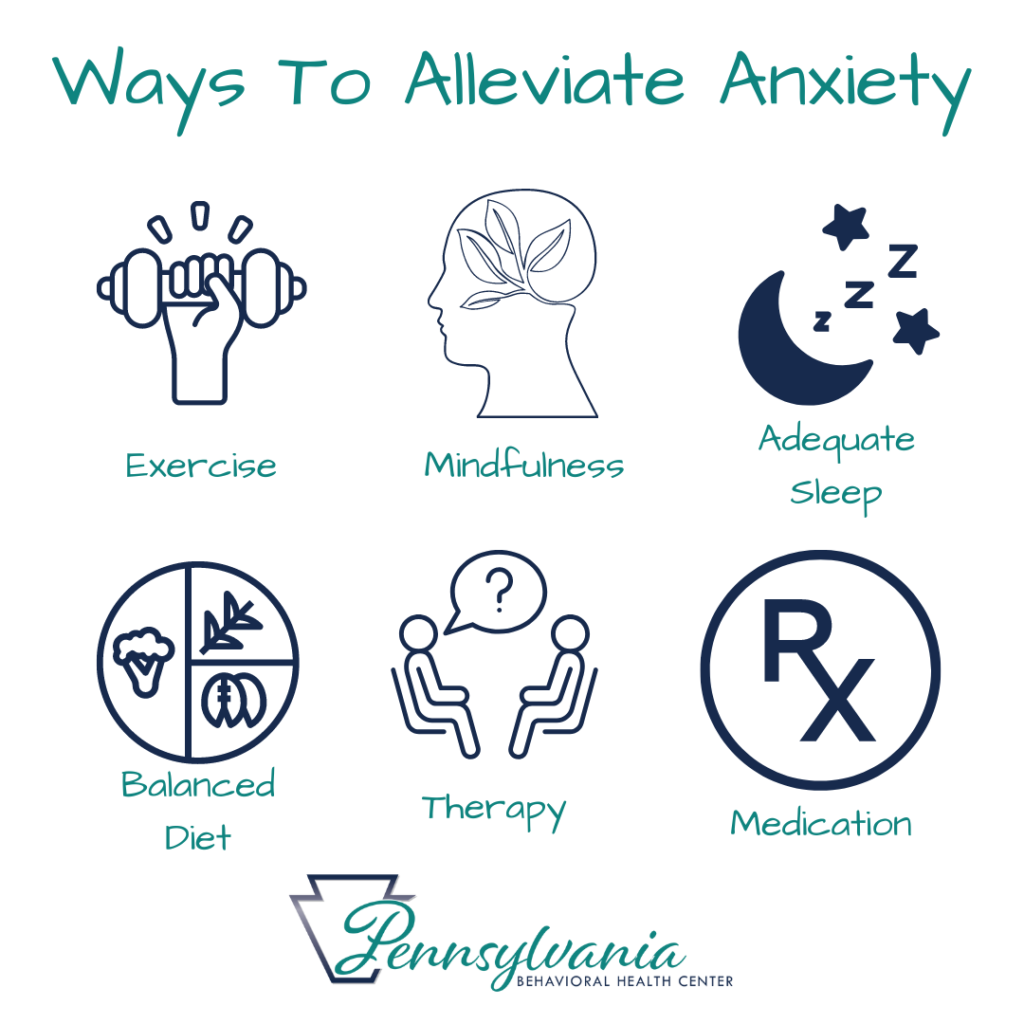Discovering Different Techniques in Counselling for Stress And Anxiety Problem for Lasting Modification
When taking on stress and anxiety problems, it's vital to check out a range of therapy techniques. Each method supplies unique insights and tools to aid you handle your symptoms efficiently. You may locate that combining techniques can yield the very best results. Nevertheless, recognizing the subtleties of these approaches is key to promoting long-term adjustment. What happens if the ideal combination could release a new level of emotional well-being for you?
Comprehending Stress And Anxiety Conditions: A Brief Summary
Stress and anxiety disorders, which affect millions of people worldwide, can significantly influence day-to-day live. You could experience frustrating sensations of concern or fret that seem uncontrollable. These feelings can bring about physical signs and symptoms like an auto racing heart, sweating, and even lightheadedness. Common types of anxiousness problems include generalized anxiousness problem, panic attack, and social stress and anxiety disorder. Each has one-of-a-kind indications, however they all share a propensity to disrupt your routine and relationships.Understanding the root creates of your stress and anxiety is important. It could originate from genetics, mind chemistry, or life experiences. Identifying your triggers can assist you handle your actions better. It is very important to bear in mind that you're not the only one in this struggle. Many individuals face comparable challenges, and seeking aid is a solid step towards feeling much better. By learning concerning stress and anxiety conditions, you're already on the course to understanding and managing your condition better.
Cognitive-Behavioral Treatment: Challenging Adverse Thought Patterns
In Cognitive-Behavioral Treatment, you'll start by recognizing the negative idea triggers that add to your anxiety. Counseling services for anxiety. When you recognize these thoughts, you'll service replacing them with even more favorable alternatives. Together, you'll develop effective coping techniques to aid manage your stress and anxiety in day-to-day situations

Recognizing Adverse Idea Triggers
Identifying the certain triggers behind your negative ideas can be necessary in handling anxiety when you run into moments of distress. Start by paying focus to circumstances that provoke sensations of worry or anxiety. Is it a congested room, a forthcoming due date, or a conversation with particular people? Write down these instances in a journal. This will help you determine patterns in your thinking. Additionally, notice physical experiences that accompany your unfavorable ideas, like a racing heart or rigidity in your chest. By identifying these triggers, you obtain insight right into what's fueling your stress and anxiety. Understanding these links is the initial step in testing those thoughts and eventually regaining control over your emotional feedbacks.
Replacing Thoughts With Positives
Testing negative thought patterns is an essential action in changing your frame of mind and lowering anxiety. You may commonly locate yourself caught in cycles of self-doubt or disastrous reasoning. As opposed to letting these thoughts determine your sensations, technique replacing them with positive affirmations or reasonable choices. When you think, "I can't handle this," shift it to, "I can handle difficulties one action at a time." This straightforward adjustment can greatly impact your emotion. Routinely recognizing and countering these negative thoughts aids produce a much healthier inner discussion. Bear in mind, it requires time and initiative, yet consistently practicing this technique can lead to lasting adjustment, encouraging you to encounter anxiousness with restored confidence and resilience.
Structure Coping Approaches Together

Mindfulness and Acceptance-Based Approaches: Growing Present-Moment Understanding
As you navigate the complexities of anxiety, incorporating mindfulness and acceptance-based approaches can considerably enhance your capacity to grow present-moment understanding. By concentrating on the present moment, you'll locate that you can observe your ideas and feelings without judgment. This practice helps you recognize your anxiousness without really feeling overwhelmed by it.Engaging in mindfulness exercises, such as deep breathing, body scans, or led reflections, enables you to ground yourself in your existing experience. Acceptance-based methods motivate you to embrace your feelings as opposed to combat versus them. When you approve your feelings, they shed their power over you.Incorporating these techniques into your daily regimen can transform just how you react to anxiety. You'll establish resilience and find out to navigate demanding circumstances with greater convenience. Eventually, cultivating present-moment recognition lays the foundation for enduring change, encouraging you to lead a much more meeting life.
Exposure Treatment: Facing Anxieties Progressively
Exposure treatment helps you face your fears in a progressive means, making it less frustrating. You'll learn methods to face anxiety-provoking circumstances detailed, while additionally building coping methods to manage your reactions (Counseling services for anxiety). This strategy empowers you to take control and decrease anxiousness over time
Progressive Direct Exposure Techniques
When dealing with stress and anxiety, progressively confronting your worries can be an effective way to restore control. This method, referred to as gradual direct exposure, involves slowly exposing yourself to the scenarios or things that trigger your anxiousness. Start with less daunting situations and progressively work your method approximately even more difficult ones. If you're afraid of public speaking, you could start by talking in front of a mirror, then proceed to sharing thoughts with a buddy, and at some point attend to a small group. Each step aids desensitize you to the worry, building your self-confidence in time. Remember, it's necessary to speed on your own and commemorate tiny success as you relocate through this process, reinforcing your capability to take care of anxiousness properly.
Structure Coping Strategies
Building effective coping techniques is essential for taking care of anxiety, specifically as you confront your concerns slowly. One powerful technique is direct exposure treatment, where you start by facing your worries in a controlled fashion. Begin with much less frightening situations and gradually function your method as much as more difficult circumstances. This gradual exposure assists desensitize you to anxiety activates, making them much less overwhelming.Incorporate leisure techniques, such as deep breathing or mindfulness, to soothe your mind during exposure. Track your progression, celebrating small victories in the process to improve your self-confidence. Remember, it's okay to take your time; the goal isn't perfection however consistent renovation. By developing these techniques, you'll equip yourself to browse anxiousness and accept life more totally.
Psychodynamic Therapy: Revealing Origin Causes of Stress And Anxiety
Psychodynamic treatment explores the subconscious mind, disclosing the root causes of your anxiousness. By examining your thoughts, sensations, and past experiences, this strategy aids you discover underlying conflicts and unsettled issues that might add to your existing stress and anxiety. You'll deal with a therapist to investigate childhood experiences, connections, and psychological patterns that form your responses today.As you gain understanding into these much deeper layers of your mind, you'll start to identify how previous events affect your present habits. This understanding can cause catharsis, enabling you to refine emotions you may have suppressed.Through the healing connection, you can additionally determine defense systems that may have established gradually, offering a clearer course to change. Inevitably, psychodynamic treatment equips you with the devices to address your anxiousness at its core, promoting long-term makeover in your psychological well-being.
Integrative and Alternative Strategies: Incorporating Strategies for Greater Effectiveness
Incorporating numerous healing techniques can boost your journey towards taking care of anxiety better (Counseling services for anxiety). By combining elements from cognitive-behavioral therapy, mindfulness techniques, and all natural methods, you can develop a personalized method that resolves your one-of-a-kind requirements. For example, you might make use of cognitive-behavioral methods to test negative idea patterns while including mindfulness exercises to ground on your own in the existing moment.Additionally, checking out all natural practices such as yoga or reflection can advertise relaxation and lower anxiousness signs. This mix allows you to establish better self-awareness and resilience.Experimenting with these diverse techniques can help you uncover what reverberates most with you. Bear in mind, it has to do with discovering a synergy that functions, instead of sticking to a solitary technique. This integrative strategy not only offers prompt relief yet additionally cultivates long-lasting skills for handling anxiousness, equipping you to recover control over your life

The Role of Assistance Solutions: Structure Strength Via Link
While it may appear that taking care of stress and anxiety is a singular journey, having a solid support system can play a necessary role in your durability. Surrounding on your own with empathetic close friends, family, or support system creates a secure room where you can freely share your sensations and experiences. When you get in touch with others, you advise on your own that you're not the check this only one in this struggle.These relationships provide support and can supply sensible coping approaches that have actually functioned for others. It's likewise a chance to gain perspective; close friends can aid you see situations in a different way, decreasing sensations of isolation.Moreover, psychological assistance cultivates a feeling of belonging, which can substantially relieve stress and anxiety signs and symptoms. By leaning on your support group, you can develop resilience and deal with challenges a lot more successfully. Keep in mind, connecting for aid is an indicator of strength, and it can make all the difference in your trip toward taking care of anxiety.
Frequently Asked Questions

What Are the Usual Signs And Symptoms of Anxiety Disorders?
You may experience uneasyness, tiredness, problem focusing, irritation, muscle tension, and rest disruptions. Physical signs and symptoms can consist of fast heart beat, sweating, and trembling. Recognizing these signs early can aid you seek suitable support and therapy.
How Much Time Does Therapy Usually Last for Stress And Anxiety Problems?
Therapy for anxiousness conditions generally lasts anywhere from a couple of weeks to several months. It truly relies on your individual requirements, progress, and the strategies your specialist uses to aid you manage your stress and anxiety successfully.
Can Drug Be Used Alongside Treatment for Anxiousness?
Yes, medication can absolutely be used together with therapy for anxiousness. Integrating both approaches often enhances therapy performance, assisting you manage signs and symptoms while discovering underlying issues through counseling. Always consult your medical care company for personalized advice.
Exist Self-Help Techniques for Handling Anxiety?
Yes, there are several self-help strategies for managing anxiety. You can exercise mindfulness, participate in regular exercise, preserve a well balanced diet, establish a routine, and use deep breathing techniques to help in reducing stress and anxiety signs and symptoms properly.
Exactly how Do I Know if I Need Specialist Assistance for Anxiety?
You need to think about seeking professional assistance for anxiety if it find interrupts life, causes considerable this hyperlink distress, or if self-help methods aren't functioning. Trust fund your reactions; connecting can result in far better coping skills and assistance. Common kinds of anxiety problems include generalised anxiety condition, panic problem, and social stress and anxiety problem. When you experience minutes of distress, recognizing the certain triggers behind your negative thoughts can be essential in handling anxiety. Replacing adverse ideas is only the start of managing stress and anxiety properly. By analyzing your thoughts, sensations, and previous experiences, this method aids you reveal underlying disputes and unsettled concerns that may contribute to your existing anxiousness. It's also a possibility to obtain perspective; good friends can help you see situations in a different way, lowering sensations of isolation.Moreover, emotional support promotes a sense of belonging, which can considerably alleviate stress and anxiety signs and symptoms.